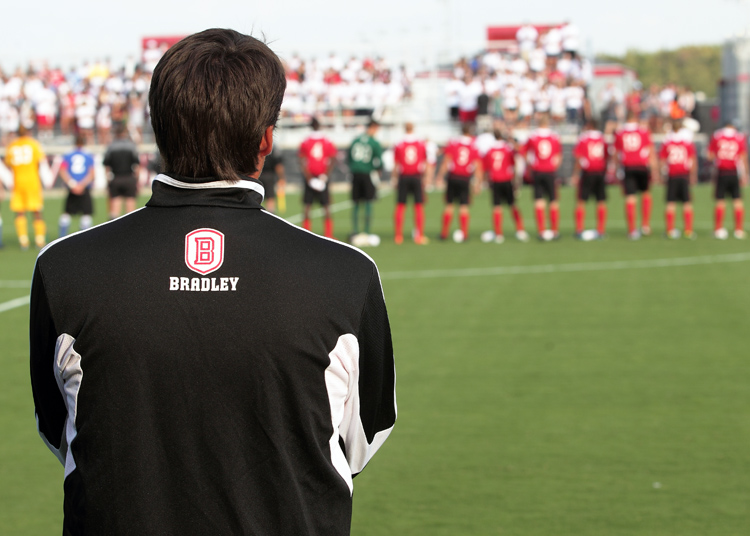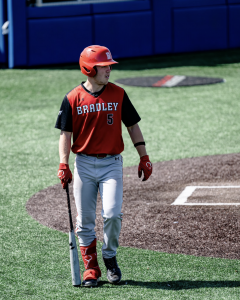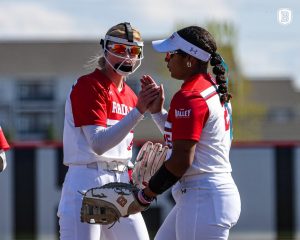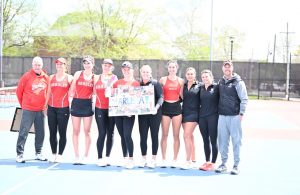
Few coaches have had such a profound impact on their programs as Bradley soccer head coach Jim DeRose. Now in his 25th year at the helm, DeRose’s impact extends far beyond wins and losses.
“The value you get in terms of the Bradley community, the Peoria community and the relationships you build,” former Bradley player and current assistant coach Tim Regan said, “The value you get in terms of the Bradley community, the Peoria community and the relationships you build – those are the key elements of the Jim DeRose, Bradley soccer era.”
A Cinnaminson Township, New Jersey native, DeRose grew up during a time when soccer was surging on the East Coast. At that time, the Philadelphia area was a soccer hotbed in the United States, which influenced the young goalkeeper’s career.
“While soccer wasn’t big in probably many other parts of the country when I was growing up … it was big where we were,” DeRose said. “I would say one of the hardest teams I’ve ever had to make was my high school team. We had three or four teams; 80-90 plus kids, maybe more than that, went through the process.”
After high school, DeRose went to college in the same state where he often vacationed during his childhood, and the same state in which his parents sought degrees: Vermont. DeRose tended goal at Johnson State College – now Northern Vermont University – from 1985 until 1988.
After earning first-team All American honors his senior year, DeRose spent a season with the New Mexico Chiles of the American Professional Soccer League in 1990. However, he soon left to explore the coaching ranks due to the instability of the team at that time.
DeRose served as an assistant coach at the University of Vermont in 1991, but he had never seen the Midwest before applying to the same position at Illinois State the following season. His time with the Redbirds was initially met by optimism – the teams were successful in the field, and DeRose and his wife had just purchased their first house in the area.
However, DeRose’s time in Normal was halted on a February morning in 1994.
“My boss, the head coach, said ‘Jim, come to my office,’” DeRose said. “I had a seat in his, and he said, ‘I’ve just been told they’re dropping the program. They’re dropping wrestling and soccer citing Title IX and gender equity, and we’re done in three months.’”
After finding a job for the next season at the University of Richmond – a time during which DeRose considered the Midwest to be in his past – things were beginning to take shape in Peoria. Bradley had just parted ways with former head coach Jerry Crabtree, and a word from Craig Dahlquist led to DeRose finding himself in the mix to become the youngest head coach in Division I history.
“Initially, I did not have an interest,” DeRose said. “One of my close friends and mentor, Jeff Gettler, who was the coach at Richmond, said, ‘You should think about it. It’s a great academic institution, does not have football, plays in a good conference, you’re young and the worst thing that could be is you have an interview and get some experience.’”
DeRose, after some initial hesitation, accepted the job. In doing so, he became the last person hired by former athletic director Ron Ferguson, a vote of confidence that the now 53-year-old veteran hasn’t forgotten.
“When I got the job, I was 28 years old,” DeRose said. “To this day, I’m beyond indebted to Mr. Ferguson … I know I wasn’t Bradley’s first choice for the job, I know they offered it to other people. I might not have even been their seventh, eighth or ninth choice.”
But it was a promise DeRose made to Ferguson in 1996 that has stuck with the program ever since.
“The only thing I told him was, in my interview, and I didn’t even know if I was gonna take the job or wanted it, but he kind of asked me a simple question. He goes, ‘If I hire you, coach, what would you say you’ll be defined by?’ and the only thing I said is, ‘Look, [I] can’t promise championships, can’t promise you anything … I’ll be the first one to turn the lights on, be the last one to leave, and I’ll run up your phone bill higher than anybody else because I’ll recruit as hard as I possibly can.”
The successes that Bradley has enjoyed on the pitch during DeRose’s tenure have been well-documented. The Braves have qualified for seven NCAA tournaments – four stemming from at-large bids and three following Missouri Valley Conference tournament championships. Off-field triumphs have been bountiful too – including multiple perfect APR scores since the NCAA began using the metric to track academic success among teams.
But DeRose’s greatest contributions have arguably been away from the pitch in the form of the relationships that he has forged with his past players.
When Tim Regan was in the middle of his six-year MLS career, DeRose was by his side the entire time.
“That’s about how you treat every day,” Regan said of the theme of DeRose’s messages. “The effort you put in, the sense of accountability and what it will do for you when it comes to potentially finding a significant other in your life, working for an employer or being a parent … all these important values… those are the messages that you constantly get.”
Since Regan joined the staff in 2017, he’s seen the other side of DeRose’s program. Whereas, for example, early morning conditioning sessions might not be the most fun for players, it is easier to see how they fit into the puzzle as a coach.
“The viewpoint for me changes in the sense that I don’t hear only what the players hear,” Regan said. “You get more of the prep work behind it, and the follow-through and the detail. It becomes a lot more clear why the messages are the way they are … for me it’s just a great learning experience and continues to enhance the relationship-building that he does with his players.”
While his silver anniversary seems somewhat tarnished by the ongoing COVID-19 pandemic, eventually the Braves will return to the pitch. To DeRose, the pandemic may merely be a blip in what has been an eventful career.
When asked what on-field success stories stand out the most, he said that the sum of it all is what he appreciates the most.
“Everyone wants to know what a moment is. As I look back, it’s the totality. I think one of the hardest things to do in mid-major sports is even [just to stay] relevant regionally year in and year out … going to the tournaments, winning conference championships … we’ve won games in the NCAA Tournament, we just haven’t been in them.”
So what makes it all possible?
DeRose is quick to credit all those who have stood by him and his program over the years.
“When I look back on it … it sounds so trite and corny almost, but when you have support in a university like I’ve had, and my family has been so embraced and welcomed into this community … we’ve perennially been in the top 25 or 30 in the nation in attendance,” DeRose said. “These types of things make you feel really good and it makes you want to keep growing the program more.”




